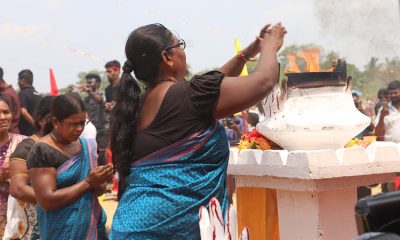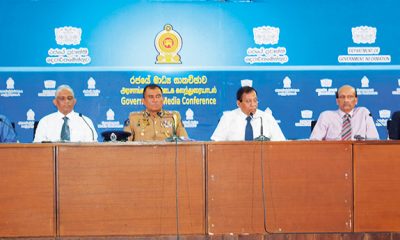Business
LAN and Ladies’ College partner for the school’s ‘Building Future Leaders’ program

The Lankan Angel Network (LAN) recently partnered with Ladies’ College, Colombo for the school’s innovative “Building Future Leaders” program. This is Sri Lanka’s first structured initiative to bring in corporate leaders, business professionals, and partners from various industry and corporate bodies, to share their experience and impart important skills which will enable the future success of these secondary school students who are at a pivotal point in their lives.
Initiated and driven by Ladies’ College Colombo, with LAN providing access to its network and expertise; “Building Future Leaders” highlights the importance of a holistic education and life skills, along with business networking, to better educate students about the new horizons available to them in terms of career opportunities within both traditional and non-traditional fields.
LAN, in collaboration with its distinguished partners Ceylon Chamber of Commerce (CCC), American Chamber of Commerce in Sri Lanka (AMCHAM), Great Places to Work (GPTW), AICPA & CIMA, additionally delivered mentoring and professional support, including offering up some highly sought after speakers, for this program.
“Shaping our future is best achieved by giving our young students every opportunity to redefine their lives by equipping them to make passionate and unique contributions that rely on creativity, courage, confidence and integrity,” opined Ms. Deepika Dassanaike, Principal of Ladies’ College Colombo. She also noted; “The ‘Building Future Leaders’ program at Ladies’ College is proving to be invaluable since it not only encourages our students to ruminate on their true potential, but it also enlightens them to a number of futuristic career paths.
Beyond that, our students have also been emboldened as a result of the program bringing in a variety of inspiring and highly successful Sri Lankan leaders from multiple fields. We are not just helping them prepare for a bright and constructive future ahead, but also equipping them with both professional and entrepreneurial skills; making their overall education prior to leaving school a truly holistic, all-encompassing experience.”
Professor Malik Ranasinghe, Chairperson of People Development Committee of Ceylon Chamber of Commerce commenting on the program said, “We are passionate about building an employable pool of future talent in Sri Lanka and we are positive that this change must start in an early stage and hence this program was initiated”.
Positive feedback about the program piloted at Ladies’ College Colombo has given LAN and its partners the confidence to explore deploying this holistic career development program at other secondary schools. Attempts to further integrate programs like these into the national school curriculums, at earlier levels, will help build the foundations of leadership into Sri Lankan society. It is also hoped that such programs will prove critical for children to experience first-hand the many different varieties of career opportunities available to them, paving the way for a brighter future. And by pushing for its adoption within the national educational system in the near future, these initiatives will help ensure that no child is left behind due to a lack of opportunity.
Commenting on the “Building Future Leaders” program, LAN Chairperson & Axiata Digital Labs Chief Peoples Officer Ms. Chandi Dharmaratne emphasized the program’s focus on holistic education, as well as its offered invaluable exposure to industry experts and leaders. “We celebrate the success of the Building Future Leaders program at Ladies College Colombo, spearheaded by Professor Malik Ranasinghe – Ceylon Chamber of Commerce and the Lankan Angel Network. This initiative has provided students with the unique opportunity to explore various industries, professions, competencies, and skills, allowing them to make informed decisions about their future pursuits. Through interactive sessions and expert-led discussions, the program has equipped students with valuable insights and networking opportunities, empowering them to confidently embark on their chosen paths.”
Ms. Dharmaratne further highlighted the program’s focus on networking and fostering connections, empowering students to become well-informed about industry requirements. And she also added that by developing essential skills and competencies necessary to overcome entry barriers in their chosen fields, the program has laid a strong foundation for students’ professional journeys with a bright promise for their future.
A platform for angel and private investors who invest in high-growth early-stage Sri Lankan ventures with the goal of creating an impact by reducing inequality, LAN, in addition to being led by a woman, features four other female board members and patrons, which is significantly more than in other Sri Lankan corporates. Supporting trailblazing programs such as the “Building Future Leaders” series, at Ladies’ College Colombo, strongly aligns with LAN’s own ongoing commitment to empowering Sri Lanka’s Women Entrepreneurs.
“It was truly a privilege and honour to work with Ms. Chandi Dharmaratne who, upon our invitation, has brought to this program a vision, as well as the involvement of a high calibre of professionals, that have inspired our girls,” said Ms. Taanya Tranchell, Career Guidance Counsellor at Ladies’ College Colombo.
Additionally, she commented; “I am also deeply grateful to Ms. Thinushka Gunasekara who came onboard to support this project and worked hard to give our students this opportunity. At a time when young people have to really work hard to find their way in the world, the knowledge and exposure the ‘Building Future Leaders’ program gave them is definitely a huge boost to their future! I hope many more schools will introduce this program as a catalyst to enriching their students with key life skills and knowledge before releasing them into the world!”
Business
Environmental devastation seen as precipitating economic crisis in Northern Sri Lanka

As parched soil cracks underfoot and once-thriving fields lie fallow, the farmers of Mannar are living on the frontlines of a crisis that is no longer just environmental — it’s economic. Climate change has tightened its grip on this northern region, and with each failed monsoon and dwindling harvest, the livelihoods of entire communities are evaporating.
The Centre for Environmental Justice (CEJ), along with local stakeholders, has raised urgent concerns over the increasingly hostile conditions faced by farmers in the region. At the heart of the problem are erratic weather patterns — prolonged droughts, unpredictable rainfall, and extreme heat — all of which disrupt the delicate balance required for traditional farming practices.
“The erratic weather patterns triggered by climate change are not only drying up water sources but also pushing already vulnerable farming communities deeper into poverty, Dilena Pathragoda, Executive Director, CEJ told The Island Financial Review.
He added: “The economic consequences are severe — from crop failures to loss of livelihoods — and without timely interventions and climate-resilient strategies, the long-term sustainability of agriculture in regions like Mannar is in jeopardy.”
In 2024 alone, nearly 3,000 acres of paddy land in Mannar District were left uncultivated due to lack of water, according to data from local agrarian offices.
In other words, this represents an estimated loss of over Rs. 225 million in potential harvest income, based on average yields and market prices. Farmers who once cultivated rice, onions and vegetables with predictable seasonal success now face devastating uncertainty.
The failure of rain-fed tanks (reservoirs) and the drying up of canals have made irrigation nearly impossible in some areas. In Nanattan and Musali divisions, water availability dropped by some 60 per cent compared to historical averages. As water becomes scarcer, so do incomes, leading many families to take on debt or abandon agriculture altogether in search of daily-wage labour.
This agricultural downturn is having ripple effects throughout the local economy. In Mannar, where over 60% of households depend directly or indirectly on farming, the collapse of agricultural productivity has led to rising food prices, shrinking local markets, and reduced cash flow for small businesses. Fertilizer vendors, seed suppliers and even transport workers are reporting significant losses.
“Some farmers have seen their seasonal incomes drop from Rs. 200,000 to under Rs. 50,000, noted one local agriculture officer. “Many are defaulting on informal loans and are now relying on relief aid to survive.”
Economists warn that this trend, if unchecked, could contribute to broader socio-economic instability. Rural depopulation, youth migration, and heightened inequality are already being observed in vulnerable districts. Women, in particular, face added burdens as household food security becomes more precarious and access to clean water requires greater physical labor.
Despite these challenges, experts insist that solutions are within reach. Climate-resilient farming techniques — such as drip irrigation, drought-tolerant crops, and community-managed water systems — have shown promise in pilot projects across other dry zones. However, scaling these up requires political will, coordinated planning, and substantial investment.
Environmental advocates also call for a shift in national agricultural policy. “Rather than pouring money into outdated infrastructure or monoculture subsidies, Sri Lanka must pivot towards sustainable, adaptive farming models, said Pathragoda. “This includes better support for farmers’ education, access to technology, and integrated land and water management.”
Civil society groups, including CEJ, are urging both the government and international donors to treat the Mannar crisis as a wake-up call. Climate finance mechanisms, they argue, must be made accessible to grassroots communities, not just large-scale development firms. Moreover, climate justice must take center stage — recognizing that those suffering most have contributed least to the global emissions causing these disruptions.
As Sri Lanka navigates an uncertain economic recovery, ensuring food security and rural resilience is more than an environmental imperative — it’s a matter of national stability, Pathragoda stressed.
By Ifham Nizam
Business
CSE and NCE partner to empower Sri Lankan exporters

The Colombo Stock Exchange (CSE) and the National Chamber of Exporters of Sri Lanka (NCE) entered into a strategic partnership to support Sri Lankan exporters by enhancing their access to capital market opportunities and broadening visibility for their businesses.
The partnership agreement was signed by Shiham Marikar, Secretary General / CEO, The National Chamber of Exporters of Sri Lanka, and Ms. Vindhya Jayasekera, Chief Executive Officer Designate, CSE. The signing ceremony was attended by Ms. Dilini Gamlathge, Assistant Director, Member Services/Operations, The National Chamber of Exporters of Sri Lanka; Ms. Punyamali Saparamadu, SVP Commercial, CSE; Ms. Himashi Wickramasinghe, Manager, Commercial, CSE; Ms. Shivandini Liyanage, SVP, Legal, Enforcement and Compliance, CSE; and Kanishka Gunawardana, Manager, Enforcement and Compliance, CSE.
This partnership with the CSE will provide NCE members—both experienced exporters and aspiring ones—with access to vital capital market knowledge and services to support their business expansion efforts.
This collaboration aims to offer exporters tools and resources to strengthen their market presence and growth potential. It also creates a platform for SMEs within the export sector to consider listing on the Colombo Stock Exchange, particularly through the Empower Board—dedicated to facilitating capital raising for small and medium-sized businesses.
Through this partnership, CSE will also gain direct access to a network of established exporters, enhancing the reach of capital market education, awareness-building, and strategic financing solutions among key players in Sri Lanka’s export economy.
The collaboration will further enable opportunities for joint forums, knowledge-sharing sessions, and networking events, providing exporters with guidance on alternative avenues for capital generation and highlighting the benefits of corporate good governance and transparency through listing.
This partnership adds credibility to the CSE and NCE’s shared efforts and signals trustworthiness to potential stakeholders, offering significant advantages for fostering growth, strategic opportunities, and long-term development within Sri Lanka’s export sector.
Business
A case for a visa-free tourism regime in SL

Sri Lanka should not have any restrictions for tourist arrivals and a visa-free regime is the need of the hour to woo more visitors, said travel and aviation expert Nihal C.B. Perera.
The founder of a family-owned company in Sri Lanka, Sparklink Travels, Perera said that Sri Lanka should offer the same ‘Visa Free facility’ initiated by Singapore and now successfully implemented by Thailand.
A former Ceylon Tourist Board, Development and Publicity Director, he said that during his time, they leased or gave several unused state land areas to build hotels. “But we told the investors that the construction has to start in six months, and this happened.”
One such venture was the opening of the Pegasus Reef Hotel at Wattala.
Perera also initiated the creation of special tourism zones in Bentota, Hikkaduwa and several other areas.
After a nearly 15-year stint at the Tourist Board, he formed his own travel company, Sparklink Travels, in 1979 with just 4 employees. “With the rapid expansion of business, and being recognized as an IATA-accredited travel agency, we increased our employee strength and moved into our own four-storey building in Bambalapitiya. We also opened a branch in Australia, he said.
“After the COVID pandemic, we also negotiated with airlines and refunded all passenger tickets purchased and cancelled due to COVID-19, Perera explained.
He recalled the days when people were issued small booklet-type air tickets and how his staff had to visit the airline offices to collect them. Perera added: “The online has changed these and I think this is a time-saving move.
“Unlike two decades ago, online and payment gateways have enabled people to book their own air tickets from home and we too have changed our strategies to find new businesses.”
Today, Sparklink Travels continues with his son Praki Perera, heading the company’s operations in Sri Lanka and Australia.
Their dedication ensures that the company remains a premier provider of air travel, cruises and tours, with professional services tailored to enhance the true essence of travel.
Perera, who has been a pioneering force in Sri Lanka’s tourism sector, was also honored as a ‘Tourism Legend’ at the annual industry awards.
By Hiran H. Senewiratne
-

 Latest News6 days ago
Latest News6 days agoNPP win Maharagama Urban Council
-

 Features3 days ago
Features3 days agoSAITM Graduates Overcome Adversity, Excel Despite Challenges
-

 Business6 days ago
Business6 days agoJohn Keells Properties and MullenLowe unveil “Minutes Away”
-

 Sports3 days ago
Sports3 days agoASBC Asian U22 and Youth Boxing Championships from Monday
-

 News3 days ago
News3 days agoDestined to be pope:Brother says Leo XIV always wanted to be a priest
-

 Foreign News4 days ago
Foreign News4 days agoMexico sues Google over ‘Gulf of America’ name change
-

 Opinion6 days ago
Opinion6 days agoRatmalana: An international airport without modern navigational and landing aids
-

 Opinion3 days ago
Opinion3 days agoDrs. Navaratnam’s consultation fee three rupees NOT Rs. 300
























